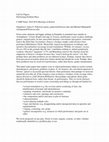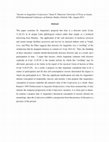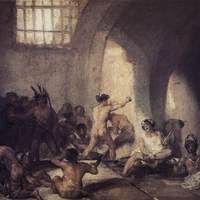Textbook by James F Patterson
Articles by James F Patterson
Syllecta Classica, 2017
Critical Days is a late antique compilation of passages from four Hippocratic treatises. This is ... more Critical Days is a late antique compilation of passages from four Hippocratic treatises. This is the first study to consider it seriously as an independent text. I conclude that Critical Days values practical considerations over theory and texts over clinical observation. Critical Days sheds light not only on late antique medicine but also on compilation as a literary activity.

This article simultaneously expands and refines the interpretive space within which we understand... more This article simultaneously expands and refines the interpretive space within which we understand Augustine’s statement that he lay down under a fig tree when he converted to Christianity in 386 (conf. 8.12.28). It rejects the claim that this fig tree is a reference to Nathanael’s fig tree at John 1:48 on both philological and contextual grounds. Nathanael is an Israelite in whom there is no deceit (John 1:47), but this is inconsistent with the Augustine whose life is narrated in conf. 1–8. Instead, Augustine’s fig tree is best interpreted in the context of the fig leaves of Gen. 3:7, the withered fig tree of Matt. 21:18–22 and Mark 11:12–14 and 20–25, and the good and bad trees of Matt. 7:15–20 and Luke 6:43–45. Together, these biblical passages indicate that the Augustine who lay down under the fig tree was still a liar by profession and deceived in his philosophical beliefs. Thus, his departure from the tree is symbolic of his conversion from the mendacious life he once led as a Manichee and rhetorician.
Book Reviews by James F Patterson
The Athenaeum Review 4 (Spring/Summer 2020)
Conference Panels by James F Patterson

From comic elements and happy endings in Euripides to potential mass murder in Aristophanes' Clou... more From comic elements and happy endings in Euripides to potential mass murder in Aristophanes' Clouds (Kopff) and rape in Terence, problematic scenes in plays challenge generic categorization. In turn, prescribed dramatic conventions and generic constraints lead to the belief that, for instance, Seneca's Oedipus simply could not have been performed (Hutchinson, Fitch). Meanwhile, logical inconsistencies in dialogue and narrative discontinuities encourage textual emendation: Willink, for instance, excises Orestes 554 on the grounds that the line " contributes nothing to, indeed gratuitously weakens, Or[estes]' argument " (175), and Rutenberg removes the choruses from his adaptation of Seneca's Oedipus because they " tend to hold up the action " (14). But perhaps these and other problems are not inherent in plays. Perhaps, instead, they derive from preconceived notions about how drama should and should not work. Perhaps, then, these problems may be resolved if performance, rather than theory, guides interpretation. This panel seeks papers that explore ways in which performance helps us resolve textual, dramaturgical, and generic problems in plays. If, for instance, the convoluted argument of Orestes' speech is successful qua bad rhetoric when performed, then perhaps we need not emend the text after all. If the extispicy scene in Seneca's Oedipus works on stage with a dancer dressed as a bull (Dodson-Robinson), then perhaps conceptions about genre should be deduced from, rather than dictate, its performance. Thus we invite abstracts that use performance to resolve issues concerning such things as (though not limited to): • textual emendation (e.g. the excision and/or reordering of lines; the identification of lacunae and interpolations) • jumping, transitions, and breaks in narrative continuity • entrances and exits; openings and conclusions • the composition and/or relevance to plot of choruses • characterization • actors playing multiple roles • logic and rhetoric (e.g. disappointing and/or unexpected turns in speeches and argumentation) • staging, costuming, sets, props • generic incongruities (e.g. instances in which performance and genre are at odds) We invite proposals on any play, Greek or Latin, tragedy, comedy, or other, whether traditionally identified as a problem play or not.
Select Conference Papers by James F Patterson

This paper examines St. Augustine's proposal that time is a distentio animi (Conf. 11.26.33) in i... more This paper examines St. Augustine's proposal that time is a distentio animi (Conf. 11.26.33) in its proper Latin philological context rather than simply as a technical borrowing from Plotinus. The application of the verb distendere to beehives (alvaria) and actual storage facilities (praetoria and horrea) in classical authors such as Vergil, Livy, and Pliny the Elder suggests that distentio for Augustine was a "swelling" of the architecture that he imagined memory to contain (cf. Conf. 10.8.12). Thus, the shedding of these structures' contents should theoretically decrease distentio and, as a result, one's participation in time. I argue that intentio, which Augustine contrasts with distentio explicitly at Conf. 11.29.39, is the mental activity by which this "swelling" may be alleviated, precisely as he claims in his report of his mystical vision of heaven at Ostia (Conf. 9.10.23-25). As a result, I propose (a) that Augustine considered time to be a matter of participation and (b) that self-contemplative intentio determined the degree to which one participated in it. This has significant ramifications not only for Augustine's abstract conception of temporality, heaven, and eternity; I also propose that Augustine's conception of intentio underlies the narrative time of the Confessions as a whole. Since Knauer's 1955 Psalmenzitate in Augustins Konfessionen, it has been assumed that, if time informs the temporal progression of the Confessions' narrative, it is from past to future. In contrast, I propose that, if Augustine's theoretical conception of intentio informs his narratology, then the Confessions exhibits a progression from the presence of the past to a presence of the present.











Uploads
Textbook by James F Patterson
Articles by James F Patterson
Book Reviews by James F Patterson
Conference Panels by James F Patterson
Select Conference Papers by James F Patterson